This volume, Franco Corelli – A Revolution in Singing (Volume 2), by Stefan Zucker comes at a time when many traditional opera customs are being looked upon with such inquisitional curiosity by today’s book burners. The directors’ various brain and sexual disorders appear to be silencing the singers and appealing to guilt laden complexes that seem to be working on the side of the devils. Make-up gone, Canio castrated, Don Jose executed by Carmen and Calaf beheaded by Turandot. How can a book, however scholarly on opera singers and composers, have any relevance today? Well, this wonderfully entertaining and enlightening book has been a source of unalloyed joy and pleasure to me and Stefan Zucker’s (Bel Canto Society) insatiable appetite for gossip, rivalry and jealousy among these artists speaks volumes. 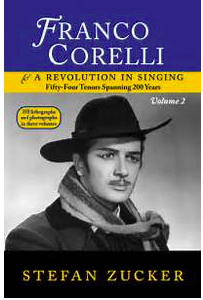
I was blessed to have been an opera-file as a young man when Franco Corelli (1921-2003) was having his triumphs. My love of the voice of the great tenor Enrico Caruso made me a follower of the careers of so many legendary names. Since Franco Corelli began his rise in the 1950’s I can aptly say I saw and heard him with his brilliant powerful voice, film star persona and the excitement of his physical presence that made him unique. No one today can rival those exceptional qualities. He had sex appeal, power, pathos and could diminish a tone until it became a whisper. His larynx lowering was part of his vocal magic. I believe that Giacomo Lauri-Volpi was the tenor who influenced Corelli the most. Franco Corelli’s personal letters to Lauri-Volpi are very touching and show his great admiration for this legendary tenor. Franco and Loretta were very devoted to Lauri-Volpi and his wife Maria and Lauri-Volpi still sang in his eighties.
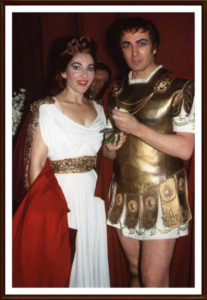
The author, Stephan Zucker, gave concerts with his mother, famed soprano Mme. Rosina Wolf, embellishing the nine high C’s in the La Fille du Regiment aria. Stefan’s mother knew Franco Corelli, who babysat for her while she was performing in Italy in 1951, watching young Stefan. Stefan became one of the great personalities in the opera world creating a “buzz” and a “stir” with his comments and his “Opera Fanatic” radio show which featured many opera singers and was truly an anchor for Franco Corelli.
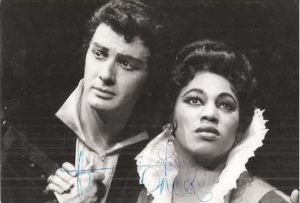
I met Stefan at the home of TV opera pioneer Lina Del Tinto and her husband Harry Demarsky and found Stefan to be not only extraordinarily intelligent, but a delightful dinner companion with a strong wit and willing ear. Mr. Zucker discusses 54 tenors spanning 200 years from cast ratings to castrati!
The great composers wrote music as well as the embellishments so championed by the great singers of the day. The singers knowledge allowed them to enhance the music with phenomenal scales and variations. But things changed and composer Gioacchino Rossini felt that a grand era was ending and that singing was becoming lackluster. Gilbert Louis Duprez formed a high C in singing that swept the opera world.
Farinelli and Velluti were not the name of a law firm in Italy but were two of the great castrati who, like dinosaurs, reigned supreme. The castrati recalled my grandmother Rosalia’s Easter and Thanksgiving feast which was a delicious capon with its tender breast meat – always tasty – never fowl. These birds were a delicious blend of male and female capabilities that evoked unique (eunuch) rich voices and many rhapsodic fans of both culinary succulents and operatic ecstasy! The last castrato, Alessandro Moreschi (1858-1922), made a series of recordings with the Vatican choir in 1902-4-for the Gaisberg Brothers, who also recorded the young Enrico Caruso as well as 93 year old Pope Leo 13th. While Moreschi was not a great castrato, he sang with rooster like tones, haunting and sad.
Rossini admired the castrati who themselves added the coloratura and vocal displays that thrilled and drove audiences to a Farinelli frenzy. When my grandparents re-visited Gangi, Sicily in the Madonie Mountains near Palermo in 1939, they took their son my Uncle Ignacio along. They planned a big surprise. The surprise was a farm girl who scrambled pigs testicles in a pan with eggs and milk. It was made for adolescent young men and was called “La Festa di Pape.” (The feast of Popes) He had the good sense to say NO, thank you! He is 91 today and a retired ballroom dancer. (Bill Tano) guess he didn’t need that extra testicular jolt!
Giovanni Battista Velluti who was a “ladies man” rather than the opposite (man’s lady), was the last operatic castrato hero and Rossini and others mourned the loss of the great “senza gazze.” Giovanni Battista Rubini (1795-1854) was a fabulous high C tenor who studied with Andrea Nozzari and sang some of the repertory of Giovanni David, who was called the “Paganini of Song.” Two wonderful illustrations of Rubini are enchanting. There is a lengthy segment on “Balls” and the varied surgeries that made castratos.
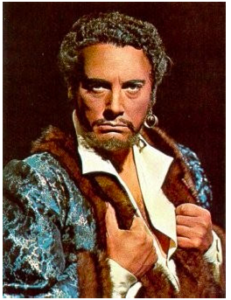
The new school of “high C ” tenors took hold ultimately, leading to such stars as Francesco Tamagno (1850-1905) Verdi’s first Otello, Enrico Caruso (1873-1921), Beniamino Gigli (1890-1957), Giacomo Lauri-Volpi)(1892-1979), Giovanni Martinelli (1885-1969), Mario Del Monaco and Franco Corelli. When Enrico Caruso passed away in 1921, the world went into mourning. Tenor Giovanni Martinelli said Lauri-Volpi, Beniamino Gigli and he had to sing the late Caruso’s roles. Mario Del Monaco (1915-1982) was a handsome, robust voiced tenor whose rise to fame was about the same as Franco Corelli. They became intense rivals. I saw both these great tenors in their prime. As soon as Del Monaco heard of Corelli coming to the Metropolitan Opera, he left. Del Monaco was not a relaxed singer. You felt the tension and saw his muscles collaborate and his burnished and dramatic tones rocked the house. Del Monaco, who I saw in Norma with Callas at the Met made a film where he was heard as “The Young Caruso.” He was also quite an exhibitionist-but that’s another story. Franco Corelli would step back, open up and out would fly these free and furious notes, defiant and heroic. Once he tapered the tone to a whisper at the end of Celeste Aida. His defiance of his Turandot, Birgit Nilsson was an outpouring of two volcanoes, his melting kiss was a triple gelato almost too much to bear. Corelli said it would not be out of place if he saw Del Monaco and punched him in the jaw. Corelli did bite Birgit Nilsson on the neck in Turandot when she held their duet note longer than he and ran offstage in Italy to challenge a student who booed him-with sword in hand!
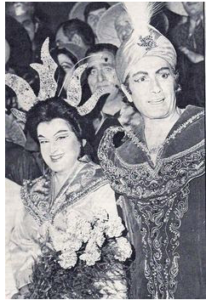
A friend, artist and Italofile James Albano, told me of Corelli’s singing of Calaf in Vienna that had women throwing their keys at him. Corelli’s wife Loretta was in constant tension about these real or imagined liaisons. She said “I was extremely jealous. If I didn’t have 10 fingernails, I had 20, to scratch out the eyes of women who were after Franco.” Corelli said that soprano Teresa Zylis-Gara was his greatest love (She was a brilliant Tosca), but he and Loretta stayed married. Franco Corelli sang at The Metropolitan Opera from 1961 until 1975. In 1975, Corelli and Tebaldi sang a legendary concert at Brooklyn College. That’s the year they both left the Metropolitan Opera. They were, according to Zucker, associates and friends, not lovers. There is a chapter on Corelli’s various liaisons, mistresses and flirtations.
This splendid book has many glorious photographs including those of Franco and Loretta. They were a handsome couple and one extraordinary shot of Franco Corelli as Turiddu and Brooklyn’s great tenor Richard Tucker as Canio. Can you imagine, seeing them both on the same night. I did! Corelli was a superb Turiddu and Tucker a great Canio. Corelli’s “Addio alle Madre” was impassioned and Richard Tucker’s heartbreaking “Vesti la Giubba” and his screamed “La commedia e finita” haunt the memory! They too were rivals but “friendly” ones. Tucker and Corelli became closer as time passed. Tucker told Corelli how to secure a note (or the other way around) and they were much friendlier after that. Metropolitan Opera Manager Sir Rudolf Bing used to assuage them by threatening to pay the other one dollar more! I recall seeing Franco Corelli at Richard Tucker’s (1913-1975) wake at the Campbell Funeral Home in New York in 1975 and he looked, in his grief, as if he had been punched in the stomach. Tucker had a brilliant 30-year career with the Metropolitan Opera. Tucker still lives on through The Richard Tucker Music Foundation run by his industrious son Barry.
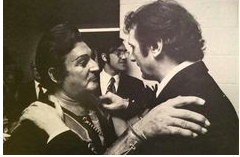
Beniamino Gigli (1890-1957) had a voice of incredible sweetness and honeyed tone. He could “cover” and also add some delicious “fortes” and made about 20 films including Forget Me Not, in England where he sang “Non Ti Scordar di me” and “Mama.” In “Mamma,” (1940) Gigli sang the title song and the delightful “Se vuoi goder la vita,” where his diminishing tones were breathtaking. Corelli listened and learned. He was no Gigli but he was renowned for his dimuendos and silvery masculine tones. Gigli’s final film was the charming Taxi di notte in 1953. I would go to the Benson Theatre with my grandparents Antonio and Rosalia Pantano to see his films. She would loudly curse the villains both wife and her lover and weep for the poor cuckolded Gigli! Gigli succeeded the mighty Caruso at the Met (1920-1932 and again in 1939 to demonstrate his Radames. He came back to America for three Carnegie Hall concerts at age 65 in 1955. I attended one of the concerts where Gigli sang a dozen arias and about 15 encores. He covered beautifully and his “covering” pianissimi were still prominent, his top, a bit short but quite thrilling. At age 65 he was still a wonder. His intoxicating and emotional “E Lucevan le stelle” tore the house down. His “Oy Marie,” and “Quanno a femmena vo” drove the audience to a frenzy. It’s all been recorded and is incredible to see, but also to witness – amazing! According to Zucker, Gigli’s greatest gift was “chiaroscuro of timbre.”
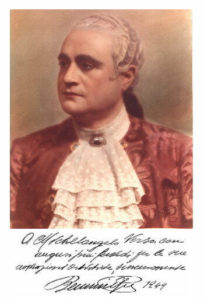
I met Franco Corelli at a Michael Sisca’s “La Follia” concert when he was about 80. I kissed his hand in respect. He said “No, no, no!” But I thanked him for the visceral thrills he gave me and so many. Corelli was a very nervous performer. His professional recordings don’t have the special “edge” that his “live” performances had. I recall with a shiver and a smile his incredible performances in his prime, but I never listen to his recordings for comfort or inspiration. Occasionally I play Gigli (I love his Spanish song “Marta”) and I always find comfort in Caruso. When not in a tenor mood, it’s great basso Ezio Pinza who moves me. Once in a while I play (castrato) Moreschis’s “Ideale” with his haunting ironic torment. On occasion, Martinelli, Peerce, Tucker, Melchior and Sicilian tenor De Stefano help fill the void.
I wish to thank Stefan Zucker for his brilliant and stimulating book with its vital and vibrant photographs. It is what opera is really about and of the importance of all these great artists who used their vocal talents to remind us of the troubadour. Rossini, Bellini, Donizetti, Verdi, Mascagni, Leoncavallo, Verdi and Puccini surely second the motion. Soprano Gigliola Frazzoni said, “Corelli was the Callas of tenors!” This splendid book has 351 pages adorned with many magnificent photographs of Franco Corelli in costume and with his wife Loretta and other artists from Maria Callas, Renata Tebaldi to great baritone Tito Gobbi. Illustrations of the distant past singers are incredibly artful and truly make the reader part of the action. Whether its romance, gossip, technical truths or memory refreshing, this book stands out as stimulating reading for the next year and decades to come. I strongly recommend Stefan Zucker’s Franco Corelli – A Revolution in Singing (Volume Two) as I did Volume One.
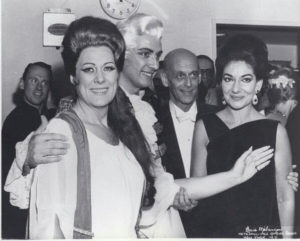
Renata Tebaldi, Franco Corelli, Sir Rudolf Bing & Maria Callas – Tebaldi & Callas reunited after feud
We eagerly await “Hitler’s Tenor,” a book on Beniamino Gigli, another tenor from the Adriatic (Recanati) whose worldwide fame put him among the gods of opera as well as thrilling audiences worldwide for over 40 years! Some may object to the relationship of Gigli to the German Nazi regime but all that will come out in Stephan Zucker’s new book. My advice is listen to Corelli and Gigli! It is artistry, voice and the universal pleasure reserved for angels and tenors!
